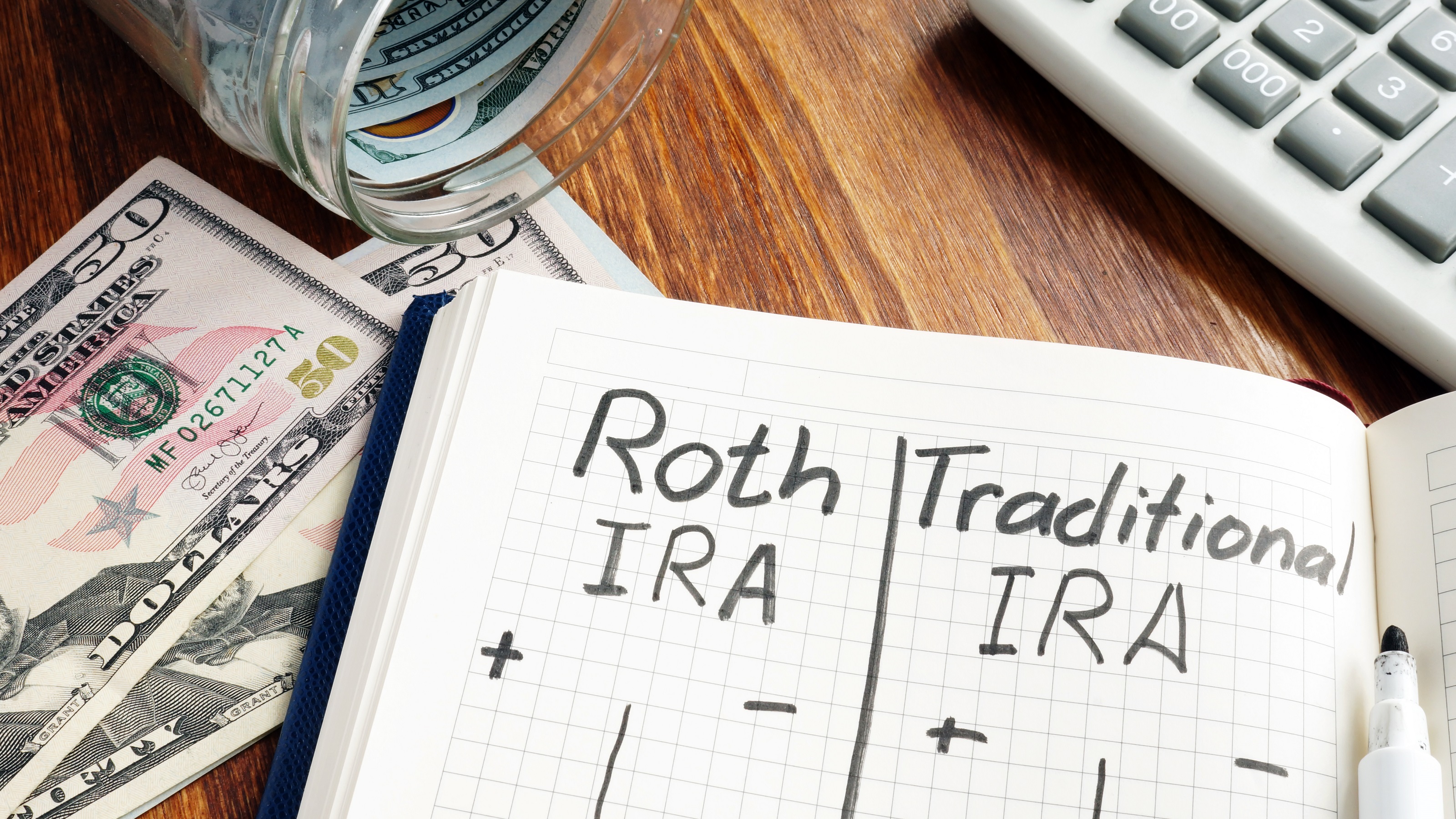Roth or Traditional: How to Choose a Retirement Tax Strategy
When picking which type of 401(k) or IRA is right for you, consider whether you want to save a little on your taxes now — or save a lot more on them later.


Profit and prosper with the best of Kiplinger's advice on investing, taxes, retirement, personal finance and much more. Delivered daily. Enter your email in the box and click Sign Me Up.
You are now subscribed
Your newsletter sign-up was successful
Want to add more newsletters?

Delivered daily
Kiplinger Today
Profit and prosper with the best of Kiplinger's advice on investing, taxes, retirement, personal finance and much more delivered daily. Smart money moves start here.

Sent five days a week
Kiplinger A Step Ahead
Get practical help to make better financial decisions in your everyday life, from spending to savings on top deals.

Delivered daily
Kiplinger Closing Bell
Get today's biggest financial and investing headlines delivered to your inbox every day the U.S. stock market is open.

Sent twice a week
Kiplinger Adviser Intel
Financial pros across the country share best practices and fresh tactics to preserve and grow your wealth.

Delivered weekly
Kiplinger Tax Tips
Trim your federal and state tax bills with practical tax-planning and tax-cutting strategies.

Sent twice a week
Kiplinger Retirement Tips
Your twice-a-week guide to planning and enjoying a financially secure and richly rewarding retirement

Sent bimonthly.
Kiplinger Adviser Angle
Insights for advisers, wealth managers and other financial professionals.

Sent twice a week
Kiplinger Investing Weekly
Your twice-a-week roundup of promising stocks, funds, companies and industries you should consider, ones you should avoid, and why.

Sent weekly for six weeks
Kiplinger Invest for Retirement
Your step-by-step six-part series on how to invest for retirement, from devising a successful strategy to exactly which investments to choose.
More people than ever are choosing to retire early, kick their feet up and enjoy their golden years. One in eight workers hopes to retire before they turn 61. However, that requires building a comfortable financial situation to survive 20, 30 or even 40 years of retirement.
That’s why choosing the right type of retirement strategy is vital to setting yourself up for financial success in your golden years. One of the biggest complaints I hear from retirees is that their taxes are too high. Tax expenses don’t end when you retire, but proper planning can help minimize your tax burden when you’re ready to use your money. Whether it’s an employer-sponsored 401(k) plan or an IRA, the choice between a traditional and Roth retirement plan requires a thoughtful approach.
It’s important to take a holistic view of your retirement fund throughout your whole life for efficient financial planning. Your ultimate goal: Maximizing your retirement fund while paying only the taxes you should owe.
From just $107.88 $24.99 for Kiplinger Personal Finance
Become a smarter, better informed investor. Subscribe from just $107.88 $24.99, plus get up to 4 Special Issues

Sign up for Kiplinger’s Free Newsletters
Profit and prosper with the best of expert advice on investing, taxes, retirement, personal finance and more - straight to your e-mail.
Profit and prosper with the best of expert advice - straight to your e-mail.
How can you minimize taxes in retirement?
There is one clear difference between Roth IRAs and Roth 401(k)s and traditional IRAs and 401(k)s: when you pay taxes on your contributions. Traditional retirement savings plans are tax-deferred, meaning any contribution you make will be tax-free — until retirement. Once the retiree starts withdrawing money, they must pay taxes on every dollar of that money. In addition, traditional accounts have required minimum distributions (RMDs), forcing you to make a minimum annual withdrawal based on how much money is in the account. This increases your taxable income.
The starting age for RMDs keeps rising — it rose from the original age of 70½ to age 72 five years ago, then to the current age of 73 and finally will creep up to age 75 in 2033 — but just know that the day will come that you’ll have to pay the piper.
Compare that with a Roth account, where contributions are taxed when they are made. While you don’t get an immediate tax break, when the money is ready to be used in retirement, it will be available to you 100% tax-free. Plus, Roth accounts don’t have RMDs.
The benefit of pre-tax contributions in traditional accounts is they lower your taxable income in the year you make them. Common wisdom used to tell workers to take advantage of pre-tax contributions. However, by delaying the tax bill until retirement, many retirees are spending more tax dollars later in life after seeing their account values grow.
So, paying taxes on Roth contributions today can lead to a smaller lifetime tax bill than you would have if you deferred taxes until retirement by contributing to a traditional account.
The big picture
It’s easy to view a tax bill on an individual year-by-year basis. However, our goal should be to pay no more taxes than necessary over our lifetime. Unless Congress takes action, the Tax Cuts and Jobs Act will sunset at the end of 2025, which could lead to tax increases for many Americans. Regardless of whether it is extended, most financial professionals expect taxes to increase in the future.
People often consider only which tax brackets they might be in at retirement rather than considering what their overall tax bill will be. Good planning should be based on what we know today: We invest to grow our account balances. Regardless of the tax bracket, higher account balances in tax-deferred accounts will lead to more taxes in retirement.
Diversifying your retirement accounts today could be an important tool for determining how those assets are held and used in retirement. One example is Roth 401(k)s, which are increasingly offered as part of employee benefit packages. They provide benefits beyond just not having RMDs and not having to pay taxes on distributions. They also give you a pool of retirement money you can draw from in emergencies without adding to your taxable income.
However, although 80% of employer-sponsored retirement plans offer a Roth option, only 17% of Americans took advantage of them, opting instead for a traditional account. Many employers offer a pre-tax match on 401(k) contributions up to a specified percentage, and employees who contribute to a Roth also can receive the match (because it is pre-tax, it would go into a traditional 401(k) account).
For many, contributing more heavily to Roth accounts can lead to a lower lifetime tax bill than sticking only to traditional 401(k)s and IRAs. Rarely do retirees complain about having too much tax-free money. Depending on your unique situation and your employer match, it may make sense to contribute to a traditional retirement account, its Roth counterpart, or both.
There can be benefits to diversifying your assets with both types of retirement accounts. The decision requires a detailed look at your financial situation. When choosing how to approach Roth and traditional accounts in your retirement strategy, work with a financial adviser who is familiar with your individual financial picture and goals.
Related Content
- Traditional Retirement Accounts or Roth? How to Choose
- Roth 401(k) Contribution Limits for 2024 and 2025
- Plan Now, Save on Taxes Later: Tax Law Reset Is Coming
- Gen X: We Need to Talk About Your Retirement
- Three Often-Overlooked Ways to Cut Your Tax Bill Now
Profit and prosper with the best of Kiplinger's advice on investing, taxes, retirement, personal finance and much more. Delivered daily. Enter your email in the box and click Sign Me Up.

As the founder and CEO of Momentum Wealth, Nico Pesci is passionate about creating efficient retirement plans and helping clients adapt to volatile economic environments. After watching his parents struggle to keep their retirement savings during the 2008 financial crisis, Nico founded Momentum Wealth to help people like his parents build the confidence they need to enjoy the retirement they deserve.
-
 The New Reality for Entertainment
The New Reality for EntertainmentThe Kiplinger Letter The entertainment industry is shifting as movie and TV companies face fierce competition, fight for attention and cope with artificial intelligence.
-
 Stocks Sink With Alphabet, Bitcoin: Stock Market Today
Stocks Sink With Alphabet, Bitcoin: Stock Market TodayA dismal round of jobs data did little to lift sentiment on Thursday.
-
 Betting on Super Bowl 2026? New IRS Tax Changes Could Cost You
Betting on Super Bowl 2026? New IRS Tax Changes Could Cost YouTaxable Income When Super Bowl LX hype fades, some fans may be surprised to learn that sports betting tax rules have shifted.
-
 Stocks Sink With Alphabet, Bitcoin: Stock Market Today
Stocks Sink With Alphabet, Bitcoin: Stock Market TodayA dismal round of jobs data did little to lift sentiment on Thursday.
-
 Your Adult Kids Are Doing Fine. Is It Time To Spend Some of Their Inheritance?
Your Adult Kids Are Doing Fine. Is It Time To Spend Some of Their Inheritance?If your kids are successful, do they need an inheritance? Ask yourself these four questions before passing down another dollar.
-
 The 4 Estate Planning Documents Every High-Net-Worth Family Needs (Not Just a Will)
The 4 Estate Planning Documents Every High-Net-Worth Family Needs (Not Just a Will)The key to successful estate planning for HNW families isn't just drafting these four documents, but ensuring they're current and immediately accessible.
-
 Love and Legacy: What Couples Rarely Talk About (But Should)
Love and Legacy: What Couples Rarely Talk About (But Should)Couples who talk openly about finances, including estate planning, are more likely to head into retirement joyfully. How can you get the conversation going?
-
 How to Get the Fair Value for Your Shares When You Are in the Minority Vote on a Sale of Substantially All Corporate Assets
How to Get the Fair Value for Your Shares When You Are in the Minority Vote on a Sale of Substantially All Corporate AssetsWhen a sale of substantially all corporate assets is approved by majority vote, shareholders on the losing side of the vote should understand their rights.
-
 Dow Leads in Mixed Session on Amgen Earnings: Stock Market Today
Dow Leads in Mixed Session on Amgen Earnings: Stock Market TodayThe rest of Wall Street struggled as Advanced Micro Devices earnings caused a chip-stock sell-off.
-
 We're 62 With $1.4 Million. I Want to Sell Our Beach House to Retire Now, But My Wife Wants to Keep It and Work Until 70.
We're 62 With $1.4 Million. I Want to Sell Our Beach House to Retire Now, But My Wife Wants to Keep It and Work Until 70.I want to sell the $610K vacation home and retire now, but my wife envisions a beach retirement in 8 years. We asked financial advisers to weigh in.
-
 How to Add a Pet Trust to Your Estate Plan: Don't Leave Your Best Friend to Chance
How to Add a Pet Trust to Your Estate Plan: Don't Leave Your Best Friend to ChanceAdding a pet trust to your estate plan can ensure your pets are properly looked after when you're no longer able to care for them. This is how to go about it.